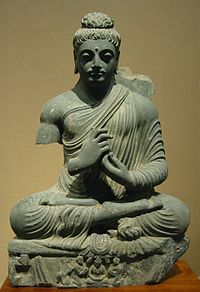Buddhist logic

Buddhist logic is a way of thinking that helps people understand things by using a set of rules and guidelines. These rules help people make sense of the world around them, and they use them to answer questions and solve problems.
Buddhist logic starts with the idea that everything in the world can be broken down into smaller parts. For example, a car is made up of wheels, an engine, and a body. The body is made up of metal, and the metal is made up of molecules, and so on.
Buddhist logicians use this idea to break down concepts and ideas, too. They ask questions like "what is the nature of reality?" or "what is the essence of being?" and they try to answer them by breaking them down into smaller parts.
To do this, they use a set of rules and guidelines called the "pramanas." These include things like observation, inference, and testimony. Observation means looking at something and seeing how it works. Inference means using what you observe to make a conclusion. Testimony means relying on information that someone else has told you.
Buddhist logicians also use other tools to help them understand reality. One of these is called "analysis." This means breaking down a concept or idea into smaller parts and looking at each part individually.
Another tool is called "reductio ad absurdum." This means taking an idea to its logical conclusion and showing how it leads to an absurd or impossible result. For example, if you say that all cats are black, but then you see a white cat, you can use reductio ad absurdum to show that your initial idea was wrong.
Overall, Buddhist logic is a way of thinking that helps people understand the world around them. It uses rules and guidelines to break down concepts and ideas, and it relies on observation, inference, and testimony to make sense of things. While it can be complex, it ultimately helps people understand reality in a more meaningful way.
Buddhist logic starts with the idea that everything in the world can be broken down into smaller parts. For example, a car is made up of wheels, an engine, and a body. The body is made up of metal, and the metal is made up of molecules, and so on.
Buddhist logicians use this idea to break down concepts and ideas, too. They ask questions like "what is the nature of reality?" or "what is the essence of being?" and they try to answer them by breaking them down into smaller parts.
To do this, they use a set of rules and guidelines called the "pramanas." These include things like observation, inference, and testimony. Observation means looking at something and seeing how it works. Inference means using what you observe to make a conclusion. Testimony means relying on information that someone else has told you.
Buddhist logicians also use other tools to help them understand reality. One of these is called "analysis." This means breaking down a concept or idea into smaller parts and looking at each part individually.
Another tool is called "reductio ad absurdum." This means taking an idea to its logical conclusion and showing how it leads to an absurd or impossible result. For example, if you say that all cats are black, but then you see a white cat, you can use reductio ad absurdum to show that your initial idea was wrong.
Overall, Buddhist logic is a way of thinking that helps people understand the world around them. It uses rules and guidelines to break down concepts and ideas, and it relies on observation, inference, and testimony to make sense of things. While it can be complex, it ultimately helps people understand reality in a more meaningful way.
Related topics others have asked about:
